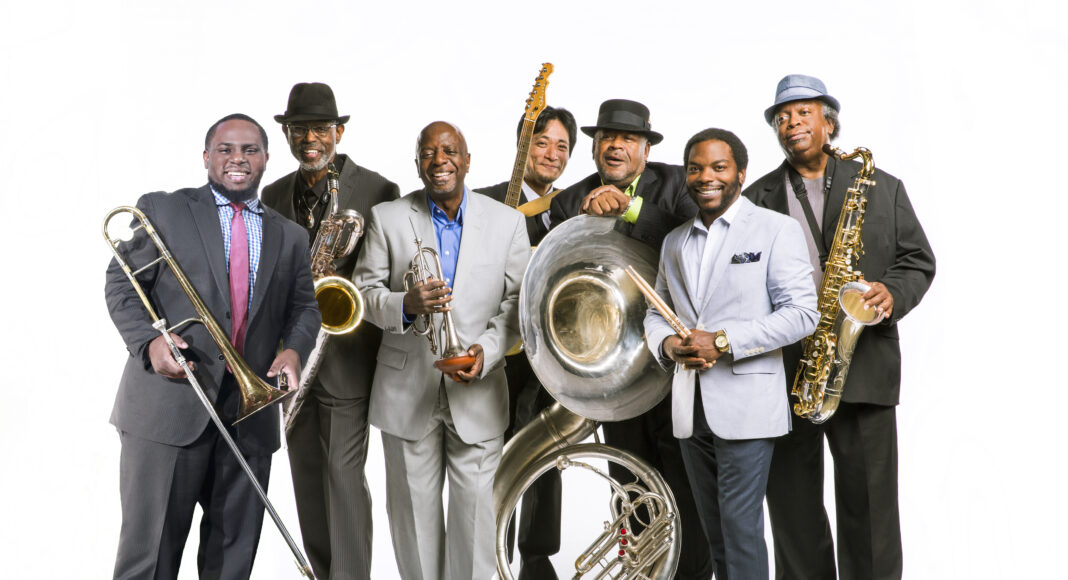Kirk Joseph is easy to spot on stage with the Dirty Dozen Brass Band. He’s the guy under the biggest horn, the one you probably think is a tuba. In fact, Joseph is one of the jazz world’s most accomplished sousaphone players.
The difference isn’t really the sound—that’s pretty much identical—but the instrument’s form. The tuba is the big brass instrument that is usually played in concert settings, from a seated position. But the sousaphone wraps itself around the player’s shoulders like a mighty python. It’s a tuba designed for marching, named after the legendary bandleader John Philip Sousa.
Just last year, the Dirty Dozen Brass Band—playing June 12 at The Ritz in San Jose—celebrated its 40th anniversary as one of the world’s greatest ambassadors of the New Orleans brass band tradition, and the sousaphone has been a central part of that long history from the beginning. Joseph is known for turning the sousaphone into a tool for funky basslines. It’s one of the most distinctive sounds in New Orleans jazz.
Joseph was just 13 in the mid-1970s when he was swept up in the maelstrom of the New Orleans sound.
“I was at home looking at cartoons on a Saturday when I got a call,” he remembers. “So, in no time, I was out the door, thinking to myself, well, here we go.”
The call was to enlist young Kirk into a grand Crescent City institution: the brass band tradition. He was no stranger to the tradition: His father was the great jazz trombonist Waldren “Frog” Joseph, whose career playing music in New Orleans dated back to the Great Depression.
Little did Kirk know that just a few years later, at the age of 16, he would jump to another band that would eventually define his career and his musical life. That band would later become the Dirty Dozen Brass Band.
But in the late ’70s, the brass band sound—famed for giving New Orleans funerals and parades their signature style—was showing its age. Disco, rock and funk were all the rage, and New Orleans jazz seemed to be only old folks’ favorite.
So, the DDBB had one clear path to survival: to innovate and modernize the brass-band sound.
“We all looked up to the New Orleans tradition,” Joseph says. “But there just wasn’t enough work for that kind of sound, so we had to do something different.”
That “something different” was the infusion of more contemporary sounds and rhythms into brass band instrumentation. The band embraced bebop, flirted with soul, reinvented R&B and welcomed funk. In their four decades performing around the world, the DDBB has explored the musical universe while remaining true to its tradition. They have given a fresh gloss to perhaps the most famous New Orleans song, “When the Saints Go Marching In” by including it on their 2012 album Twenty Dozen, and the band has recorded such moving religious material as “Amazing Grace.”
At the same time, DDBB has put its stamp on covers of everything from Charlie Parker to Michael Jackson. The band’s collaborations with such notables as David Bowie, Modest Mouse and Widespread Panic have taken it pretty far afield. Its response to the ruinous Hurricane Katrina was to record an interpretation of Marvin Gaye’s landmark album “What’s Going On.” All of it raised a lot of eyebrows back home.
“Sometimes people just want to keep things as they are,” Joseph says, “because they’re afraid of becoming obsolete. And we got a lot of that (backlash) from some of the traditionalists. But when my father gave me the OK and told me what we were doing was cool, that was all I needed to hear. All he said was, just play it with distinction.”
With the band’s 40th anniversary celebrations behind them, the seven members of the Dirty Dozen are ready to move in new directions. The oldest band member is north of 75, the youngest in his 20s.
“Back in the beginning, I was the youngest,” laughs Joseph, 57. “Now it’s a real challenge to keep this thing going strong. But we’re all focused. There’s just too many things we need to do before we get out of here.”
Dirty Dozen Brass Band
Jun 12, 7pm, $12+
The Ritz, San Jose



